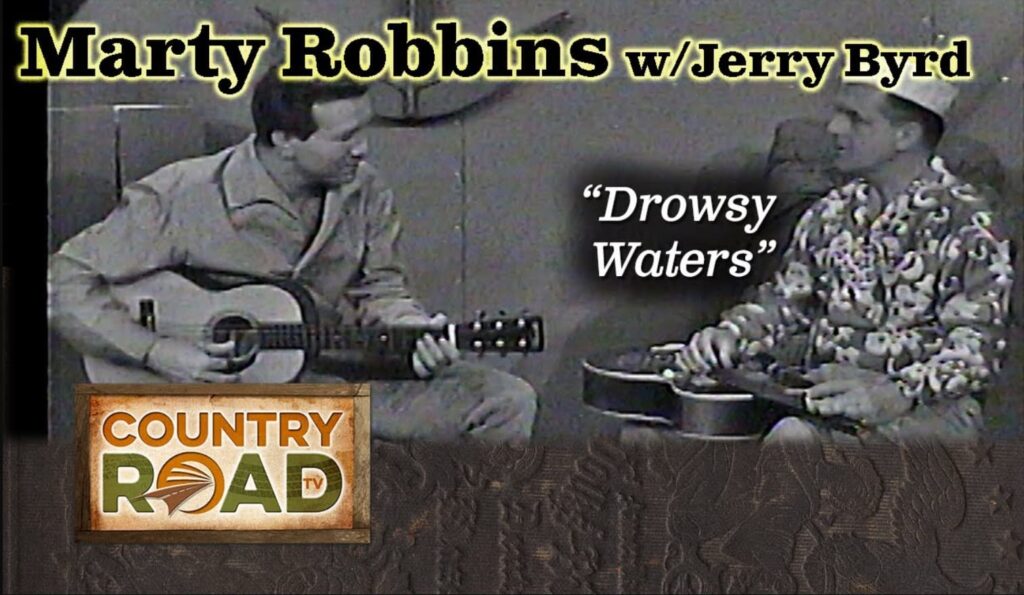
Drowsy Waters: A Lament for a Lost Love, Drifting on a River of Sadness
A Timeless Ballad of Longing and Loss
In an era when music was more than just a fleeting tune—it was a story, a memory, a feeling—Marty Robbins delivered a performance that has lingered in the hearts of listeners for generations. His 1957 rendition of “Drowsy Waters,” featuring the exquisite steel guitar work of Jerry Byrd, stands as a testament to the power of a simple, honest ballad. It wasn’t a smash hit in the way we measure them today, but its impact was felt deeply by those who heard it. Released as the B-side to “The Story of My Life,” the song quietly charted, reaching a respectable No. 5 on the Billboard Country & Western charts. This achievement speaks volumes, as it was a period dominated by rock ‘n’ roll’s burgeoning energy. Yet, “Drowsy Waters” found its place, a quiet eddy of melancholy in the swift current of popular music.
The song’s essence is a gentle, yet profound, ache. It tells the tale of a man who returns to a familiar place, a river, a place where he and his beloved once spent joyful days. The river, however, is no longer a source of happiness; it has become a mirror reflecting his profound loneliness. The title itself, “Drowsy Waters,” is a masterful metaphor. The water is not raging or tumultuous; it is slow, heavy, and tired, much like the narrator’s spirit. It is a river of sorrow, carrying with it the weight of his memories. The story is a universal one: the pain of returning to a place rich with shared history, only to find it hollowed out by absence. It evokes a feeling many of us have experienced—that bittersweet sensation of revisiting a cherished spot, only to be overwhelmed by the ghost of what once was. It’s a song that understands the quiet devastation of seeing the same moon, the same trees, but without the one person who made them special.
What makes this song particularly poignant is the partnership between Marty Robbins’s velvety smooth vocals and Jerry Byrd’s masterful steel guitar. Robbins’s voice is the anchor, steady and full of emotion, delivering each lyric with a sense of genuine heartbreak. His phrasing is impeccable, allowing the listener to feel every ounce of his sorrow. But it is Jerry Byrd’s steel guitar that truly brings the narrative to life. It is not just an instrument; it is a second voice in the song. The notes weep and sigh, mimicking the ebb and flow of the drowsy waters. Its sound is melancholic and ethereal, a ghostly melody that drifts alongside Robbins’s words. This collaboration elevates the song from a simple ballad to a work of art, a perfect fusion of vocal and instrumental storytelling. The steel guitar is the ghost of the narrator’s memories, a haunting echo of a love that has passed.
For those of us who came of age during that time, “Drowsy Waters” is more than just a song; it’s a bookmark in our lives. It reminds us of a simpler time when a song could carry a whole world of emotion without needing to be loud or bombastic. It brings to mind late-night drives, quiet moments of reflection, and the bittersweet ache of first loves and inevitable goodbyes. It’s the kind of song that whispers to the soul, not shouts. It’s a reminder that some of the most profound emotions are found not in grand gestures, but in the quiet, reflective moments of a life well-lived and a love well-lost. The song’s legacy lies in its enduring ability to resonate with anyone who has ever felt the weight of a memory, and the longing for a past that can never be reclaimed. It’s a classic, not because of its chart position, but because of its timeless truth.